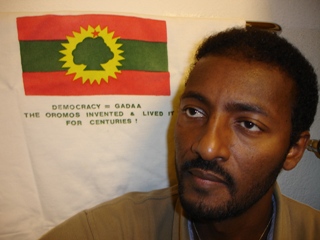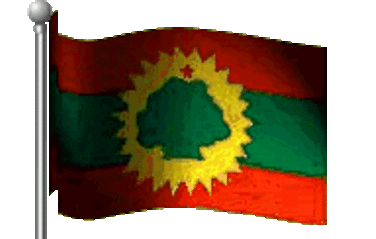Advisers of shanee-qinijjit / Shanee Asmera/ and Shanee jijjiiramaa soon resume talks in Ethiopia
By Abera Oluma
Oromo Liberation Front (OLF) was founded early 1970s to liberate Oromia from the Abisinian colonizers. In the 40 years struggle for freedom, different factions have been twisted in the organization. The enemy has been fostering insiders using different systems, to eliminate OLF. But it was felled by the defence of actively bonded Oromoo nationalist and gallant fighters.
These obstacles reappeared by reorganizing themselves with modified strategy in relative to their previous actions in the year 2000. Their primary objective was to erode the struggle for liberation to self determination and change the direction by blunting the Oromo vision. They decided to mark a borderline against the genuine OLF leaders and members. Then they snatched the name OLF and secluded at the Asmara based cage.
Their new slogan is ‘democratization of Ethiopia’ which is completely contrary to the interest of Oromo people. They became part and parcel of coalition for Democracy and unity (CUD).
With the help of foreign governments they held Bargain conference in 2004 to make their interests official in front of their mediators. Then on the stage they pledged their denouncement of arm struggle and to start discussion with the dictatorial government of Ethiopia, for power share. Their step was not less than surrendering to Absinian government who colonized Oromia.
Fortunately, their trial couldn’t be accomplished due to Mr. Meles’ precondition requirements. So Shane Qinijit remained with uncertainty and handicapped messengers to sit-down for talk with Meles. As a result, they lagged behind their own dream of power sharing in election. As the result, Shane kinijit paused and became stagnant.
As the consequence of their tires’ flatness, Shanee Qinijjit has encountered internal division on its leadership into two classes two months ago.
The new faction branch named itself, “Jijirama”. The difference in between these two factions is the Jijjiiramaa members are from the same region but their policy is similar to the Shane Qinijjit’s. They are just to reform the Shane Qinijit’s program.
The current breakaway indicates that by the name of the OLF, the two factions are going to resume soon talks in Addis Ababa with a negotiating team drawn from Ethiopian elders.
The agreement was reached after an Ethiopian negotiating team led by Professor Efrem Yisahk held first round talks with the Shanee-Qinijjit and Jijjirama leaders in the Netherland.
During their first round talks which stayed 3 days from sep19-21, the negotiating team including Ethiopian Ambassador to Netherland and Pastor Daniel Gebreslase, has met and discussed with top leaders of Shanes’ including Lencho Leta, Abbaabiyya Abbaa-jabir and Dima Nego.
Mr Lencho lata is presented on this talk as representative of Shane-Qinijit led by Mr. Daud Ibsa and Mr. Dima Nago and Abbabiyyaa Abbaa-jobir are presented as representative of Shane-Qinijjit called itself Shanee jijjiiramaa led by defector of OPDO Kamal Galchu.
After the discussion, both Shanees’ leaders have agreed to hold second round talks at Addis Ababa in the near future.
The governments of Netherland, Norway and Germany have financially assisted for the success of the talks.
Professor Efrem Yisahk was one of the former amnesty committee who enabled a successful negotiation for the release of 38 opposition figures, including several CUD members and leaders.
As of the previous program of Oromo liberation (self determination) either of these groups will do nothing. The struggle for liberation requires pertain motivation and sacrifice.
As an individual, they have the right to go anywhere they like, including Ethiopia and share the brutal government’s policy.
But as of the OLF’s program they can’t find any recognition from Oromo people. Because morally and historically it will not be right to give-up the struggle and handover to the enemy in which our youths, men and women have been sacrificed.
The reckless group of power hunger can’t bring fundamental change for Oromia.
Even if they continue to pursue the genuine oromo people to find endorsement, their chance is very low. Despite of all the obstacles created by the enemy, OLF is implementing the well designed and accepted program with its fully committed members and supporters.


